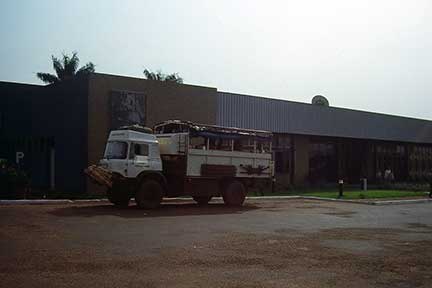 Mbula, Zaire's "Ghost City"
Mbula, Zaire's "Ghost City"
January 13, 1988
For weeks, the trip leader had been telling us about Zaire. "This," he said, "is the real Africa, the Africa you came to see. The roads are worse than any we've been on so far. We'll probably get stuck in mud again and again. The villages are remote and it's difficult to find things you need, especially food items. We'll be days away from telephones or medical facilities at times."
Imagine our surprise when, just after crossing the border, we pulled into Mbula, a city sporting modern office buildings, beautiful gardens, landscaped parks, and a five-star hotel that could have graced any western city. We felt out of place entering the hotel in our travel-worn clothing. We needed to exchange money—just enough to last until morning when the banks would open.
The exchange desk had little local currency. "Why call it an exchange desk?" I wondered. We finally managed to exchange a small sum and found a beautiful terrace with a bar. An ice-cold Coca Cola sounded wonderful!
This was not what we had expected in Zaire. It was more like Europe. Still, something wasn't right. The hotel was well-staffed with smartly uniformed porters, bellboys and waiters. Everything was sparkling clean and beautifully arranged for comfort and luxury.
But there were no guests. No cars or buses filled the parking lot. There was little evidence the hotel was ever used.
We each ordered a drink, priced at 100 zaires each, and gave the waiter a 1000-zaire note. Time passed, and we finished the Cokes, but the waiter had disappeared and we were wondering about our change. I went to ask about it, using my newly-acquired French.
"Sorry," he said. "We do not have change. You must pay with correct change."
"But we finished the drinks, and we don't have any smaller bills!" I protested.
"You may have more drinks, or perhaps one of your friends can help," he said, motioning toward a rowdy group from the truck.
I couldn't imagine the two of us drinking eight more Cokes by ourselves, so I asked the others if anyone had change or wanted a drink and could pay us back later. No one did.
I went back to the waiter, but he was adamant. Things seemed at an impasse. No five-star hotel I'd ever heard of would be unable to change the equivalent of a $10.00 bill for a $2.00 purchase! It was ridiculous! We'd have been happy to take the eight Cokes and store them in our locker for later, but in Africa, that's impossible. Vendors are responsible for returning all the bottles. They charge a deposit of up to double the price of the Coke when they allow you to take the bottle even a short distance away.
At last, more people from the truck showed up and helped us out by drinking some Cokes.
We camped that night on a modern university campus. It looked like a campus in the U.S., with 1970-style buildings. Again though, something was wrong. There were no students. Guards opened a building to allow us to use the water and showers. Inside were women with tiny babies camping in the classrooms. Windows were broken and the toilet were full of maggots. It was like a scene from "The Twilight Zone." We dubbed Mbula the "Ghost City." There was a sense that everything was unreal and out of place. We didn't see ghosts, but it wouldn't have surprised us any more than what we did see.
The next morning, Dennis and I walked around after changing money at the bank and found a grocery store. Regular grocery stores are rare in Africa—open markets and small shops predominate. Inside, we found Brie cheese, pickled herring, and hundreds of western specialty items we had not seen in months, all for reasonable prices. Could this be the country the trip leader described?
Mbula was an anomaly. We learned later that the president's wife had been born there. To honor her, all those buildings were erected. I thought about all the people in Zaire starving and without decent health care, and the roads, which desperately needed attention.
Those things weren't priorities for the president, Mobutu Sese Seko. He embezzled the equivalent of over $5 billion United States dollars from his country. His daughter was married in a $70,000 wedding gown, wearing $3 million worth of jewels. Seko paid Muhammad Ali and George Foreman each $5 million to come to Zaire and fight on October 30, 1974 in a match known as the "Rumble in the Jungle."
There is an old saying that foreign aid is taking money from poor people in a rich country to give to rich people in a poor country. Zaire's "government" was a shining example of our tax dollars at work.
Seko was eventually deposed. Zaire is no more. The country was renamed the Democratic Republic of the Congo and the river is now called the Congo River.
Go on to Thieves
Source: www.SusanCAnthony.com, ©Susan C. Anthony
